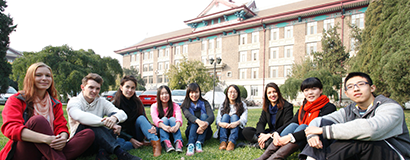When borrowing books in a library, have you ever encountered such embarrassment that the database shows that the book you want is on the shelf but you just cannot find it? It happens all the time that the books “lose their way back home” because of nonstandard borrowing and lending. Given that there are countless books in the National Library and university libraries, some of whose circulation may reach millions, it has become a crucial issue to guarantee the books are “all in their position”. A breakthrough made by Tianjin University helps solve the problem. The AI “Zhi Tu” (Intelligent Books) robot developed by TJU can help the wayward books find their place as well as discover and analyze readers’ interest in books and optimize the purchase and placement of books. So far, the robot has already been put into service in TJU Library and began to patrol in the library.

The robot integrates various cutting-edge technologies such as robot navigation, map construction, radio frequency (RF) positioning, computer vision and artificial intelligence, and it can also realize automatic and intelligent book inventory counting with high accuracy and efficiency compared with traditional manual counting. The “Zhi Tu” robot can quickly familiarize itself with the site and will automatically avoid obstacles. When the robot moves in the library, it constructs the scene map of the entire library through radar, with which it can quickly adapt to the new and complex application site and realize the automatic navigation function. It is also equipped with high-precision sensor equipment to effectively avoid unexpected barriers such as people walking around and other obstacles. When counting inventory, the reader named RFID installed inside the robot can automatically scan the books on the shelves, read the label information and complete the book positioning work. However, due to the interference of multipath effect and other factors, the RF signal is not very stable, resulting in some errors in the ordering of local books. Therefore, the research team used computer vision and artificial intelligence to identify the words on book spines and caried out local correction of RF book positioning results, which can further improve the accuracy of inventory counting. The robot can determine exactly which shelf, floor and position each book is placed on. By comparing the inventory results with the database information, the books in the wrong place can be found in time. In the future, with robotic arms, “Zhi Tu” will also be able to automatically reposition books.
In addition, the team developed the “Zhi Qu” (intelligent interest) system with depth camera and RFID technology to optimize the library smartness and intelligence together with “Zhi Tu”. “Zhi Qu” system is fixed on the top of the bookshelves and it can identify the movement of students flipping through books and identify them through face recognition. In order to realize the technology, the team has had to overcome several technical challenges such as the match between people and books and movement recognition. The system can dig into readers’ interests in reading and the popularity of certain books. This kind of information can provide readers with personalized recommendation of books they may be interested in, evaluate their learning performance over a period of time, help the library optimize and adjust book placement, and provide corresponding guidance for book purchasing.
The robot is designed by a team led by Li Keqiu, Director of College of Intelligence and Computing and winner of the National Science Fund for Distinguished Young Scholars. The team hopes to solve more technical problems in the field of wireless sensing and not only to publish academic achievements in international high-level journals and conferences, but also to write the research achievements in the motherland and make them rooted in the lives of ordinary people, so that the public can truly feel the convenience and intelligence brought on by information technology to their daily’s lives.
By: Deng Xiaoxuan
Editors: Gabriela Venegas, Sun Xiaofang






